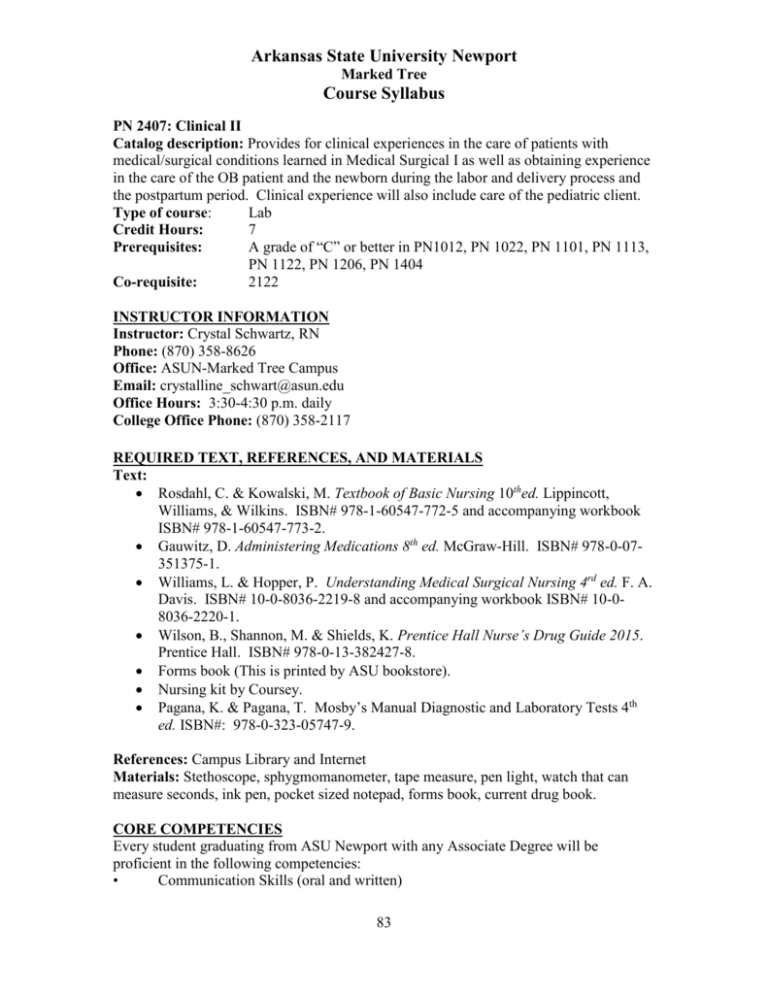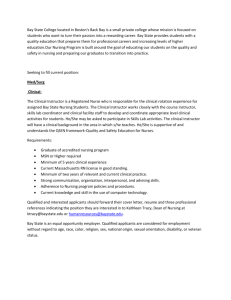Home | Portal - Arkansas State University
advertisement

Arkansas State University Newport Marked Tree Course Syllabus PN 2407: Clinical II Catalog description: Provides for clinical experiences in the care of patients with medical/surgical conditions learned in Medical Surgical I as well as obtaining experience in the care of the OB patient and the newborn during the labor and delivery process and the postpartum period. Clinical experience will also include care of the pediatric client. Type of course: Lab Credit Hours: 7 Prerequisites: A grade of “C” or better in PN1012, PN 1022, PN 1101, PN 1113, PN 1122, PN 1206, PN 1404 Co-requisite: 2122 INSTRUCTOR INFORMATION Instructor: Crystal Schwartz, RN Phone: (870) 358-8626 Office: ASUN-Marked Tree Campus Email: crystalline_schwart@asun.edu Office Hours: 3:30-4:30 p.m. daily College Office Phone: (870) 358-2117 REQUIRED TEXT, REFERENCES, AND MATERIALS Text: Rosdahl, C. & Kowalski, M. Textbook of Basic Nursing 10thed. Lippincott, Williams, & Wilkins. ISBN# 978-1-60547-772-5 and accompanying workbook ISBN# 978-1-60547-773-2. Gauwitz, D. Administering Medications 8th ed. McGraw-Hill. ISBN# 978-0-07351375-1. Williams, L. & Hopper, P. Understanding Medical Surgical Nursing 4rd ed. F. A. Davis. ISBN# 10-0-8036-2219-8 and accompanying workbook ISBN# 10-08036-2220-1. Wilson, B., Shannon, M. & Shields, K. Prentice Hall Nurse’s Drug Guide 2015. Prentice Hall. ISBN# 978-0-13-382427-8. Forms book (This is printed by ASU bookstore). Nursing kit by Coursey. Pagana, K. & Pagana, T. Mosby’s Manual Diagnostic and Laboratory Tests 4th ed. ISBN#: 978-0-323-05747-9. References: Campus Library and Internet Materials: Stethoscope, sphygmomanometer, tape measure, pen light, watch that can measure seconds, ink pen, pocket sized notepad, forms book, current drug book. CORE COMPETENCIES Every student graduating from ASU Newport with any Associate Degree will be proficient in the following competencies: • Communication Skills (oral and written) 83 1. Students will demonstrate effective listening, speaking, reading, and written communication skills. 2. Students will identify an appropriate audience when producing and utilizing listening, speaking, reading, and written skills. 3. Students will discern the purposes of listening, speaking, reading, and written skills. • Math Skills 1. Students will demonstrate the ability to solve problems using a mathematical process. 2. Students will show the ability to distinguish between multiple types of equations and apply the correct problem solving procedure. 3. Students will demonstrate the ability to graph equations. 4. Students will display, analyze, and interpret data. • Critical Thinking Skills 1. Students will evaluate concepts learned and apply them to assignments that reflect real life scenarios. (Life application) 2. Students will demonstrate the ability to locate and effectively assess value, relevance, authority, and applicability of information. (Information literacy) 3. Students will demonstrate the ability to identify the type of problem and, from multiple problem solving methods, choose the best method for a possible solution to the problem. (Problem solving) • Technology Skills 1. Students will demonstrate basic skills required to utilize computer hardware, software, and external devices. 2. Students will display the ability to access and utilize an array of software programs both online and offline. 3. Students will show the capacity to communicate electronically including the sending and receiving of email and adding and opening attachments. 4. Students will demonstrate skills necessary to utilize the campus Learning Management System (LMS) to access direct and indirect academic tools and resources. COURSE COMPETENCIES Upon completion of this course, students will be able to: 1. Identify that learning is a never-ending process. 2. Demonstrate appropriate basic procedures, then progressing to more complex procedures within the scope of the practical nurse. 3. Function as an active health care team member. 4. Describe the legal/ethical issues that affect the practical nurse and the client in the clinical setting. 5. Communicate effectively with clients, families, and members of the health care team. 6. Demonstrate appropriate critical thinking skills in the clinical setting. 7. Calculate intake and output. 8. Delegate appropriate skills to non-licensed personnel. 9. Individualize patient care according to the patient’s medical condition and development. 10. Identify community resources available to the patient. 11. Discuss the impact of the patient’s culture on the administration of nursing care. 12. Obtain vital signs accurately. 13. Calculate pediatric dosages accurately including IV medication. 84 14. Demonstrate safe and effective administration of OB medications as allowed by the Nurse Practice Act. 15. Realize learning is a life-long process. 16. Gain in-depth knowledge in caring for the medical/surgical patient and exercising judgment within the PN scope of practice. 17. Identify the steps of the nursing process and participate in the development of a care plan. 18. Describe appropriate nursing care and how it varies throughout the client’s life span and with the client’s culture. 19. Calculate medication dosages correctly. 20. Demonstrate safe clinical practices within the PN scope of practice. 21. Discuss the disease process, including the client’s medications, treatments, and diagnostic procedures. 22. Perform an assessment specific to the client’s diagnosis. 23. Demonstrate appropriate charting skills. 24. Demonstrate beginning delegations skills to non-certified personnel. 25. Apply beginning skills associated with managing care for a group of clients. COURSE ACTIVITIES Observation of skills performed by medical professionals Demonstration of skills Completion of case studies, care plans, drug cards, reports Consultation with supervisors Participating in daily report CRITERIA AND SCALE Medical Surgical Clinical Section…………………………….34% Nursing of Mother and Infant Section………………………..33% Nursing of Children Section………………………………….33% TOTAL…………………………………………………...100% ASUN-Jonesboro Nursing Grading Scale A = 93 - 100 B = 85-92 C = 76-84 D = 65-75 F = Below 64 A grade of “C” or better is required on all sections pass PN 2407. MISSION STATEMENT ASU-Newport provides an accessible, affordable, quality education that transforms the lives of our students, enriches our communities and strengthens the regional economy. Americans with Disabilities Act (ADA) In order to obtain appropriate disability related accommodations and services to which they are entitled, students with documented disabilities should voluntarily and confidentially provide the Office of Disability Services (870-358-8636 or disabilityservices@asun.edu ) with appropriate medical documentation regarding the nature and extent of their disability, make their needs known to this Office and follow 85 established procedures for acquiring needed services and accommodations in the classroom or online. ACADEMIC DISHONESTY Dishonesty in any form (including plagiarism, turning in assignments prepared by others or unauthorized possession of exams) may result in the student receiving an “F” and/or being suspended from the university. STUDENT CONDUCT Students should attend every session of every course in which they are enrolled. As such, students are responsible for all material and information that was given out in class. In addition, excessive tardiness will not be allowed; therefore, three class “tardies” will be considered an absence. ADVISING STATEMENT Students are encouraged to remain in close contact with their academic advisor to assess degree progress and ensure the timely completion of programs of study. COURSE OUTLINE Observe and perform the skills obtained in Nursing of Children. Observe and perform the skills obtained in Nursing of Mother and Infant Observe and perform skills learned in Medical/Surgical Nursing I Theory. Observe and apply skills learned in Pharmacology. Observe and apply skills learned in Nutrition. Observe and apply skills learned in Basic Principles and Skills. Observation of the following skills by a LPN 1. Management Principles 2. Delegation of procedures to unlicensed assistive personnel INSTRUCTOR’S LAB POLICIES Professional Behavior: Students are expected to abide by the rules and procedures detailed in the Student Guidelines and to maintain professional behavior at all times. See guidebook for clinical attire and clinical equipment. Any violation of HIPAA will result in immediate dismissal from the program. Safe Clinical Practice: Students are expected to abide by the rules and procedures detailed in the Student Guidelines and to maintain safe clinical practice at all times. See list of procedures that student may not perform. Absence Policy: Attendance in clinical courses will be measured in clock hours. Accruing the specified number of clock hours is required for successful course completion. Each time that a student is absent, tardy, or leaves early the clinical evaluation may be reduced by 5 points per incident. Forfeiting a final letter may result for each subsequent lab absence over 16 clock hours. Arriving after the assigned clinical time is considered “tardy.” Three tardies is equivalent to one absence. 86 Leaving before class is dismissed is considered “departing early”. Three early departures is equivalent to one absence. If a student is unable to attend clinic and does not notify the clinical site or an instructor at least 30 minutes before the clinical rotation begins, it may result in the student forfeiting 25 points on the clinical evaluation. If the student is over 30 minutes late to any clinical rotation, the student will be sent home and no clock hours will be accrued for the day. In order to be recommended to apply for the Arkansas State Board of Nursing Licensing examination students must fulfill the program clock hour requirement. Therefore hours lost to absences must be made up at the instructor’s discretion. Personal Electronic Devices: Personal electronic devices must be kept either on silent or turned off and kept in your backpack/purse while in the classroom unless you are given permission by the instructor. Personal electronic devices are not allowed in the clinical areas. Emergency calls may be made to the main office and you will be notified. If the student violates this guideline, he/she will be sent home for the remainder of the day and will not accrue hours. Clinical Assignments: Make-up policy-It is the student’s responsibility to contact the instructor about assignments he/she may have missed when absent. Late assignment policy-A late assignment may result in the student receiving a zero. The instructor reserves the right to make changes as necessary to this syllabus. Students will be informed in class of any changes. 87





